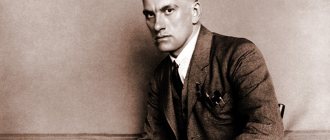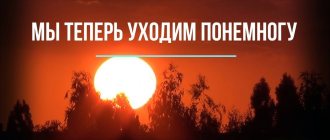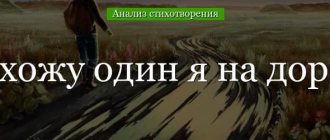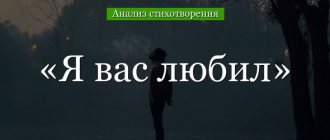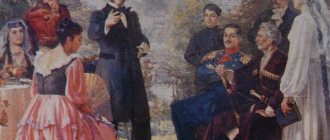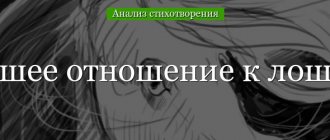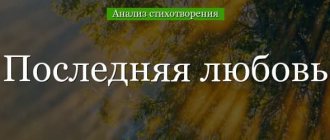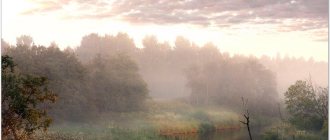Son Vanya asks his father, the general, who built the railway. The general attributes its construction to Count Pyotr Andreevich Kleinmichel.
The narrator - a fellow traveler traveling with them in the same compartment - does not agree with the general’s words and begins his story about the real builders of the railway. The narrator tells the boy about the merciless king, who drove the people to construction, about famine.
It was he who drove the masses of people here. Many - in a terrible struggle, calling these barren wilds to life, found a coffin here for themselves.
Listening to the story of his fellow traveler, Vanya falls asleep. In his dreams, he sees ordinary men - real railroad builders. From them the boy learns how difficult the work given to the ordinary Russian people is.
Don’t be shy for your dear fatherland... The Russian people have endured enough, They have also endured this railway road - They will endure everything that God sends!
The locomotive whistle blows and the boy wakes up. The child tells his father about his dream, but he just laughs. He calls the common people barbarians, incapable of creating anything, and reproaches the narrator for telling sad stories to the boy.
The narrator agrees to describe the “bright side” - the work is done, the men are going to the office to pay, but they are not given money, on the contrary, they still owe money. The arriving contractor accepts the work and says that he will give them the arrears, and in addition rolls out a barrel of wine. The men are happy about this too.
Railway
Vanya (in the coachman’s Armenian jacket).
Vanya (in a coachman's jacket). Dad! who built this road? Dad (in a coat with a red lining). Count Pyotr Andreevich Kleinmichel, my dear! Conversation in carriage
1
Glorious autumn! Healthy, vigorous Air invigorates tired forces; The fragile ice lies on the chilly river, like melting sugar;
Near the forest, as if in a soft bed, you can sleep well - peace and space! The leaves have not yet had time to fade; they lie yellow and fresh, like a carpet.
Glorious autumn! Frosty nights, Clear, quiet days... There is no ugliness in nature! And kochi, and moss swamps, and stumps -
Everything is fine under the moonlight, I recognize my native Rus' everywhere... I quickly fly along cast-iron rails, I think my thoughts...
2
Good dad! Why keep Smart Vanya in his charm? Let me show him the truth in the moonlight.
This work, Vanya, was terribly enormous and beyond the capabilities of one person! There is a king in the world: this king is merciless, Hunger is his name.
He leads armies; Rules ships at sea; herds people into the artel, walks behind the plow, stands behind the shoulders of stonemasons and weavers.
It was he who drove the masses of people here. Many - in a terrible struggle, calling these barren wilds to life, found a coffin here for themselves.
The road is straight: narrow embankments, posts, rails, bridges. And on the sides there are all Russian bones... So many of them! Vanechka, do you know?
Chu! menacing exclamations were heard! Stomping and gnashing of teeth; A shadow ran across the frosty glass... What was there? Crowd of the dead!
Either they overtake the cast-iron road, or they run sideways. Do you hear the singing?.. “On this moonlit night, we love to see our work!
We toiled under the heat, under the cold, With our backs always bent, We lived in dugouts, struggled with hunger, We were frozen and wet, and suffered from scurvy.
The literate foremen robbed us, the bosses flogged us, the need was pressing... We, God's warriors, endured everything, Peaceful children of labor!
Brothers! You are reaping our benefits! We are destined to rot in the earth... Do you remember us poor people kindly, or have you long forgotten us?..”
Do not be horrified by their wild singing! From Volkhov, from mother Volga, from Oka, from different ends of the great state - These are all your brothers - men!
It’s a shame to be timid, to cover yourself with a glove, You’re no longer small!.. With Russian hair, You see, standing, exhausted with fever, A tall, sick Belarusian:
Bloodless lips, drooping eyelids, Ulcers on skinny arms, Standing forever in knee-deep water, Legs swollen; tangles in hair;
I'm digging into my chest, which I've been diligently leaning on the spade all my life, day after day... Look at him, Vanya, carefully: It was hard for the man to earn his bread!
He hasn’t straightened his hunchbacked back even now: he’s stupidly silent And with a mechanical rusty shovel he’s hammering away at the frozen ground!
It wouldn’t be a bad thing for us to adopt this noble habit of work... Bless the people’s work And learn to respect the peasant.
Don’t be shy for your dear fatherland... The Russian people have endured enough, They have also endured this railway road - They will endure everything that God sends!
He will endure everything and pave a wide, clear path for himself. It’s just a pity - neither I nor you will have to live in this beautiful time.
3
At that moment a deafening whistle squealed - the crowd of the dead disappeared! “Dad, I saw an amazing dream,” Vanya said, “five thousand men,
Representatives of Russian tribes and breeds suddenly appeared - and he told me: “Here they are, the builders of our road!..” The general laughed!
“I was recently within the walls of the Vatican, I wandered around the Colosseum for two nights, I saw St. Stephen in Vienna, Well... did the people create all this?
Excuse me for this impudent laugh, your logic is a little wild. Or is Apollo Belvedere worse than a stove pot for you?
Here are your people - these thermal baths and baths, a miracle of art - they took everything away!
“Your Slav, Anglo-Saxon and German Do not create - destroy the master, Barbarians! a wild crowd of drunkards!.. However, it’s time to take care of Vanyusha;
You know, it’s a sin to outrage a child’s heart with the sight of death and sadness. You should now show the child the Light Side...”
4
Glad to show you! Listen, my dear: the fatal labors are over - the German is already laying the rails. The dead are buried in the ground; the sick are hidden in dugouts; working people
They gathered in a tight crowd at the office... They scratched their heads tightly: Everyone owes the contractor a stay, Absentee days have become a penny!
The foremen wrote everything down in a book - Whether he took it to the bathhouse, or was lying sick: “Maybe there is a surplus here now, But here you go!..” They waved their hand...
In a blue caftan - a venerable meadowsweet, Fat, stocky, red as copper, A contractor is riding along the line on a holiday, Going to see his work.
The idle people make way decorously... The merchant wipes the sweat from his face and says, with his arms akimbo, in a picturesque manner: “Okay... nothing... well done!.. well done!..
With God, now go home - congratulations! (Hats off - if I say!) I put out a barrel of wine to the workers And - I give the arrears!..”
Someone shouted “hurray”. They picked it up Louder, more friendly, more drawn out... Lo and behold: The foremen were rolling the barrel with a song... Here even the lazy one could not resist!
The people unharnessed the horses and the merchant with a cry of “Hurray!” rushed along the road... It seems difficult to draw a more gratifying picture, general?..
Means of artistic expression
In his poem, the author uses a large number of tropes and literary devices that help him completely recreate the problem of the life of peasants in that era. The work contains such means of artistic expression as:
- Comparisons - “Ice... lies like melting sugar”, “Near the forest, like in a soft bed, you can sleep well.”
- Epithets - “glorious autumn”, “Healthy, vigorous air”.
- Hyperbole - “This work, Vanya, was terribly enormous.”
- Metonymy - “And on the sides there are all Russian bones.”
- Personifications - “The whistle blew a deafening sound.”
A brief analysis of the poem “Railroad” makes it clear to the reader the main idea that the author wanted to convey to him.
Nekrasov raised a problem that occurs in modern society. The use of the labor of weak people for personal gain is the main problem that worries us to this day.
Means of expression
Various artistic means were used in the poem “Railroad”. Among them there are often comparisons
: “Ice... lies like melting sugar”, “Near the forest, like in a soft bed, you can sleep well”, “Leaves... yellow and fresh lie like a carpet”, “... the venerable meadowsweet, thick, planty, red as copper” .
In addition, other means can be observed, for example, metonymy
: “And on the sides there are all Russian bones”,
personification
: “The whistle screeched deafeningly.”
The abundance of means of expression helps to recreate a bright, living picture of the reality of that time, which appears before us when reading the poem.
History of creation
The poem “The Railway” was written by Nekrasov in 1864 and published in the Sovremennik magazine. The Nikolaev railway was built from 1942 to 1952. and allowed me to travel a distance that previously took a whole week in just 24 hours. Nicholas I issued a decree on the construction of the first Moscow-Petersburg railway in a unique way: he drew the road on the map using a ruler, through forests and swamps. The cost of such a project is human sacrifice and work in impossible conditions.
The construction was supervised by Kleinmichel, who by the time the poem was written had been removed from his post for cruelty. The topic of building a railway was also relevant in 1964, under Alexander II, who built railways with the help of workers and peasants freed from serfdom in 1861. Literary direction, genre
Nekrasov is considered a singer of civil lyrics, a poet of the realistic movement. In general, the poem is accusatory in nature and is truly an example of civil lyricism. But its first part is a wonderful lyric poem.
Theme, main idea and composition
The poem consists of 4 parts. They are united by the plot, the image of the lyrical hero-narrator and his neighbors in the carriage: the general and his son Vanya, whose dialogue about the road builder is the epigraph.
The first part is a description of Russian autumn nature, which the narrator sees from the train window. There is no ugliness in nature, it is perfect.
The second part contrasts with the first. This is a monologue by the narrator, revealing the imperfections of society. Vanya paints a picture of the suffering of the railway builders - the Russian people. The narrator describes a host of poor people who died during construction, so that the impressionable boy even becomes shy. The main idea is contained in the last three stanzas: you need to respect hardworking people, because they have endured a lot and thanks to this endurance they will come to a happy future. Nekrasov accurately notices the mentality of a people capable of enduring suffering for centuries. Today the phrase “It’s just a pity - I won’t have to live in this beautiful time - neither me nor you” has acquired the ironic meaning of “never”, which Nekrasov did not put into his poems.
The third part is the objections of the father general. In his opinion, people prone to drunkenness are not capable of creating anything great, but can only destroy. Dad offers to show Vanya the bright side.
In the fourth part, the narrator tells Vanya that after the construction of the road, the workers’ reward was a barrel of wine and forgiveness of the arrears that the cunning contractors calculated for everyone.
Meter and rhyme
The poem is written in dactyl tetrameter in the first part, which in the remaining parts alternates with trimeter with a shortened last foot. This rhythm is best conveyed by the sound of train wheels. The alternation of female and masculine rhyme in the first stanza, which describes nature, is replaced by the alternation of dactylic and masculine in some stanzas and feminine and masculine in others. The rhyme pattern in the poem is cross.
Paths and images
The first part is written in the best traditions of landscape poetry. Nature is characterized by the epithets glorious autumn, healthy, vigorous air, fragile ice, icy river, clear, quiet days. Nekrasov uses vivid comparisons: ice is like melting sugar; you can sleep in the leaves, like in a bed.
To describe hunger as the root cause of people's misfortunes, Nekrasov uses personification. Words with diminutive suffixes contrast with the terrible picture of death: little road, pillars, Vanechka - and Russian bones. Nekrasov showed true skill in describing portraits of the unfortunate. It is impossible to forget the tall, sick Belarusian. This detail is especially touching: even after death, the ghost of a Belarusian mechanically chisels the frozen earth with a shovel. The habit of work has become automatic among the people. The second part ends with a symbolic image of a wide, clear road and a beautiful time.
In the third part, the general's monologue, there are almost no tropes. The general’s speech is clear, unambiguous and devoid of images; logic prevails in it. Only the epithet “bright side” is vague, which the narrator is in a hurry to take advantage of.
In the fourth part, maintaining the general’s concise and logical style, the lyrical hero describes the “bright future” of the workers.
Poem "Railroad"
Vanya (in the coachman’s Armenian jacket).
Dad! who built this road? Dad (in a coat with a red lining), Count Pyotr Andreevich Kleinmichel, darling! Conversation in the carriage
Glorious autumn!
Healthy, vigorous Air invigorates tired forces; The fragile ice lies on the chilly river, like melting sugar;
Near the forest, as if in a soft bed,
you can sleep - peace and space! The leaves have not yet had time to fade; they lie yellow and fresh, like a carpet.
Glorious autumn!
Frosty nights, Clear, quiet days... There is no ugliness in nature! And kochi, And moss swamps, and stumps -
Everything is fine under the moonlight,
I recognize my native Russia everywhere... I fly quickly on cast-iron rails, I think my thoughts...
Good dad!
Why keep Smart Vanya in his charm? Let me show him the truth in the moonlight .
This work, Vanya, was terribly enormous
and beyond the capabilities of one person! There is a king in the world: this king is merciless, Hunger is his name.
He leads armies;
ships at sea ; herds people into the artel, walks behind the plow, stands behind the shoulders of stonemasons and weavers.
It was he who drove the masses of people here.
Many - in a terrible struggle, calling these barren wilds to life, found a coffin here for themselves.
The road is straight: narrow embankments,
posts, rails, bridges. And on the sides there are all Russian bones... So many of them!
Vanechka, do you know? Chu!
menacing exclamations were heard! Stomping and gnashing of teeth; A shadow ran across the frosty glass... What was there?
Crowd of the dead! Either they overtake the cast-iron road,
or they run sideways. Do you hear the singing?.. “On this moonlit night, We love to see our work!
We toiled under the heat, under the cold,
With our backs always bent, We lived in dugouts, struggled with hunger, We were frozen and wet, and suffered from scurvy.
The literate foremen robbed us,
the bosses flogged us, the need was pressing... We, God's warriors, endured everything, Peaceful children of labor!
Brothers!
You are reaping our benefits! We are destined to decay in the earth... Do you still remember us poor people kindly, Or have you forgotten us long ago?..”
Do not be horrified by their wild singing!
From Volkhov, from mother Volga, from Oka, from different ends of the great state - These are all your brothers - men!
’s a shame to be timid, to cover yourself with a glove,
You
’re no longer small !
tangles in hair; I'm digging into my chest, which I've been diligently
leaning on the spade all my life, day after day... Look at him, Vanya, carefully: It was hard for the man to earn his bread!
hasn’t straightened his hunchbacked back
even now: he’s stupidly silent And with a mechanical rusty shovel he’s hammering away at the frozen ground!
It wouldn’t be a bad thing for us to adopt this noble habit of work Bless the people’s work And learn to respect the peasant.
Don’t be shy for your dear fatherland...
The Russian people have endured enough, They have also endured this railway road - They will endure everything that God sends!
He will endure everything and
pave a wide, clear path for himself. neither I nor you will have
to live in this beautiful time At that moment a deafening whistle
squealed - the crowd of the dead disappeared! “I saw, dad, an amazing dream,” Vanya said, “five thousand men,
representatives of Russian tribes and breeds.
Suddenly they appeared - and he told me: “Here they are, the builders of our road!” The general laughed!
“I was recently within the walls of the Vatican,
I wandered around the Colosseum for two nights, I saw St. Stephen in Vienna, Well... did the people create all this?
Excuse me for this impudent laugh,
your logic is a little wild. Or is Apollo Belvedere worse than a stove pot for you ?
are
your people - these thermal baths and baths,
art - took everything away! , Barbarians! a wild crowd of drunkards!.. However, it’s time to take care of Vanyusha;
You know, it
’s a sin to outrage a child’s heart with the sight of death and sadness. Now you should show your child the Light Side...”
I’m glad to show you!
Listen, my dear: the fatal labors are over - the German is already laying the rails. The dead are buried in the ground; the sick are hidden in dugouts;
The working people gathered in a tight crowd at the office...
They scratched their heads tightly: Everyone owes a contractor a stay, Absentee days have become a penny!
The foremen wrote everything down in the book -
Whether he took it to the bathhouse or was lying sick: “Maybe there is a surplus here now, But here you go!..” They waved their hand...
In a blue caftan - a venerable meadowsweet,
Fat, stocky, red as copper, A contractor is traveling along the line on a holiday, He is going to look at his work.
The idle people make way decorously...
The merchant wipes the sweat from his face and says, with his arms akimbo in a picturesque manner: “Okay... well done... well done!.. well done!..
With God, now go home - congratulations!
(Hats off - if I speak!) I put out a barrel of wine to the workers And - I give the arrears!..”
Someone shouted “hurray”.
They picked it up Louder, more friendly, more drawn out... Lo and behold: The foremen were rolling the barrel with a song... Here even the lazy one could not resist!
The people unharnessed the horses and the merchants
with a cry of “Hurray!” rushed along the road... It seems difficult to draw a more gratifying picture, General?..
The poem “The Railway” was written by Nekrasov in 1864 and published in the Sovremennik magazine. The Nikolaev railway was built from 1942 to 1952. and allowed me to travel a distance that previously took a whole week in just 24 hours. Nicholas I issued a decree on the construction of the first Moscow-Petersburg railway in a unique way: he drew the road on the map using a ruler, through forests and swamps. The cost of such a project is human sacrifice and work in impossible conditions.
The construction was supervised by Kleinmichel, who by the time the poem was written had been removed from his post for cruelty. The topic of building a railway was also relevant in 1964, under Alexander II, who built railways with the help of workers and peasants freed from serfdom in 1861.
History of creation
The work is dedicated to the construction of the first railway in Russia. The corresponding decree was issued by Nicholas I in 1842. It was supposed to connect Moscow and St. Petersburg. The work, under the leadership of Count P. A. Kleinmichel, was completed in record time - in 1852.
N. A. Nekrasov’s poem “The Railway” appeared in the Sovremennik magazine in 1864. The work became key in the civil poetry of that time. The poet was more interested not in what benefits the new road brought to his fatherland, but in what price this construction cost the Russians.
The work is a dialogue between the general and his son, Vanechka, as well as the narrator-author, who objects to “dad” about the fact that the road was built in good conditions.
